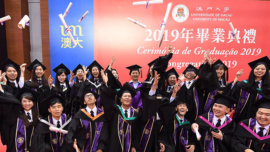Voters in Cape Verde, a bastion of democracy in Africa, go to the polls on Sunday after a campaign dominated by the Covid pandemic and its impact on a tourism-dependent economy.
In a continent marked by political unrest, coups or monolithic rulers who have been in power for decades, the tiny Atlantic archipelago stands out.
It ranks just behind Mauritius as the most democratic country in sub-Saharan Africa in the Economist Intelligence Unit’s 2020 Democracy Index.
“Cape Verde is a model of political and democratic stability in Africa,” said Alioune Tine, founder of the Afrikajom Center think tank.
It is “virtually the only one which has not experienced an electoral or democratic crisis.”
Sunday’s vote could lead to something that many other Africans could only dream of — a peaceful change of government.
Prime Minister Ulisses Correia e Silva’s Movement for Democracy (MpD) is being closely contested by the African Party for the Independence of Cape Verde (PAICV), a socialist party led by Janira Hopffer Almada.
Almada, 42, is bidding to be the first woman prime minister of Cape Verde, a group of tropical islands with a population of some 550,000 about 600 kilometres (375 miles) from Senegal.
In 1990, one-party rule in Cape Verde was swept away, leading to the first multi-party elections the following year.
In 2016, the MpD ended the PAICV’s 15-year run with a historic victory, gaining 40 out of the 72 seats in the single-chamber parliament, the National Assembly.
After a campaign marked by festive rallies, where candidates danced to music — another of Cape Verde’s internationally recognised treasures — the outcome Sunday is more than likely to be accepted serenely.
“Stability… is our oil, our diamonds,” Silva told AFP on the sidelines of a rally in the capital Praia where, clad in jeans and a polo shirt, he chatted to voters.
“For us, freedom, institutions and having checks on power are a priority… this is why we have an opposition.”
– Covid and economy –
Silva is a 58-year-old former bank executive and ex-mayor of Praia, who was educated in Portugal, the colonial power until independence in 1975.
During his term in office, Cape Verde was hammered by a three-year drought, which was followed by the catastrophic impact of the coronavirus pandemic on foreign tourism, which accounts for roughly a quarter of the economy.
Both major parties are pitching on measures to provide wide access to vaccination and to diversify the economy.
The PAICV says the government failed to provide sufficient and timely aid when the pandemic started to bite.
“Many measures were not implemented when they would have been useful… and many others did not reach their intended target,” Almada told the Portuguese news agency LUSA.
The slim lawyer, like Silva a former minister, became in 2014 the first woman and the youngest person ever to take the helm of the PAICV.
Four small parties are also contesting the poll, the results of which are expected overnight Sunday.
Cape Verde has a semi-parliamentary system in which the prime minister wields executive power while the president plays the part of arbitrator in the event of intractable disputes.
Elections for the presidency take place on October 17.




















